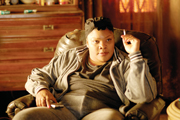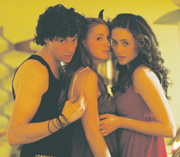Sundance 2009
Heights despite lows.
By Lawrence Ferber
PARK CITY, UTAH:
Quieter, sunnier, warmer, less crowded and circus-like than usual, this year’s Sundance Film Festival, which ran from January 15–25, was also characterized by a plethora of high-quality films. Celebrating its 25th anniversary, the festival was frequently overshadowed by real-world events—Obama’s inauguration, news of further economic woe/layoffs (by Warner Bros. and Microsoft)—yet every day saw premieres of excellent, thought-provoking, audacious works.
For example? In I Love You Phillip Morris, we watched a sweaty, thrusting Jim Carrey eagerly fulfill a man’s request to do what used to be illegal between two men in Texas.

Possibly Sundance’s most anticipated queer-interest title, the based-on-a-true-story comedy stars Carrey as gay con man Steven Jay Russell, whose romance with another prisoner (played by Ewan McGregor) and non-stop swindles and prison breaks lead to plenty of laughs and heartbreak. The day following its premiere, the filmmakers—including writer/director team Glenn Ficarra & John Requa (Bad Santa), executive producer Luc Besson, Carrey, McGregor, and co-star Rodrigo Santoro (who plays one of Carrey’s previous lovers)—held a press conference at Main Street’s Queer Lounge. Carrey admitted the raucous “ass” scene was a reason he did the movie, and that despite his criminal streak, Russell (who’s currently in prison) is a good guy at heart.
“We’re all good guys—your worst enemy is a good guy!” he shared. “I love to get to the bottom of a character. What lies they believe about themselves. He felt like he needed acceptance. Beware the unloved—they go to extremes to find significance.”
The film, still seeking a distributor at fest’s close, utilized actual prisoners as extras. “They were life prisoners, so they had a calm to them,” McGregor recalled during the second screening’s Q&A. One convict took McGregor aside to make a creative suggestion. “He said, ‘I think there should be a scene where I fight Jim for you.’” The real Morris makes a cameo, playing a lawyer, during a final courtroom scene.

Speaking of juries, one of the festivals biggest winners was out director Lee Daniels’ U.S. Dramatic Competition title, Push: Based on the Novel by Sapphire. Newcomer Gabourey Sidibe (who was reportedly discovered on a street corner) stars as Precious Jones, a Harlem high schooler whose life represents a virtual onion of adversity: illiterate and obese, she endures nonstop abuse from her monstrous, unloving mother (Mo’Nique), was raped by her father, and bore two children as a result—one, with Down Syndrome, is named Mongol (short for Mongoloid). She only finds comfort from a nurturing lesbian teacher, and escape in fantastical blackouts.
The film is powerful as much as entertaining, heart-wrenching as much as hopeful, tragically funny as much as terrifying, and boasts typecast-busting performances from Mo’Nique—who, during the festival, admitted she had been molested by a family member and infused her character with that evil—Mariah Carey (dressed down as a social worker), and Lenny Kravitz (as a male nurse). Since acquired by Lionsgate, Push snagged Grand Jury, Audience, and Special Jury Prize for Acting (for Mo’Nique) awards.

Another winner of both distribution deal (with Magnolia) and Sundance prize (for Spirit of Independence) was writer/director Lynn Shelton’s comedic Humpday, in which two straight men challenge themselves to have sex on camera for a Seattle amateur porn contest. And local director Frank Feldman won Spirit of Slamdance honors for his short, Vapid Lovelies.
Peter Bratt’s La Mission received a standing ovation at its premiere. Set in San Francisco’s Mission district, it stars Benjamin Bratt as Che, a good-hearted yet violently homophobic Latin father whose teenage son (Jeremy Ray Valdez) comes out. At a post-screening Q&A, the Bratts explained how the character of Che represents our culture, one of using brute force and violence to achieve goals, as well as spark conversations within communities of color. Meanwhile, out writer-director Tina Mabry’s accomplished Slamdance feature, Mississippi Damned, addressed homophobia and generational clash within a poverty-ridden African-American family.
A surefire conversation-stirrer, Julian Breece’s stunning short film, The Young and Evil, saw a black teen “bug chaser” attempt to get infected by an HIV-positive AIDS-prevention activist. Equally disturbing, but in a non-real-world way, was Paul Solet’s comedy-horror film Grace, in which a lesbian midwife helped her bisexual ex birth a ghoulish, blood-drinking infant. Also darkly humorous, Nancy Kissam’s Drool updated Bound with its tale of a repressed housewife who kills her husband and runs off with her sassy black neighbor, moody daughter, and budding gay adolescent son.
In the desert-dry French absurdist comedy, Louise-Michel, an incompetent FTM transsexual hit man is enlisted to kill a corporate boss. A gay man cruising the beach finds an unexpected connection with a woman in Italy’s One Day in a Life. Spun from Philadelphia writer David Brind’s 2005 short of the same name, Dare chronicles a love triangle between a gay teen, his female best friend, and the bisexual bad boy they both crush on.
As for lame ducks? Ensemble drama The Informers, based on Brett Easton Ellis’ novel, was pointless and vapid, while despite its talented leading ladies—including Rachel Dratch, Amy Poehler, Parker Posey, and Jane Lynch—out director Ryan Shiraki’s Spring Breakdown was barely more pleasant than a case of spring break-contracted herpes.

Film proved secondary on inauguration day, as many festgoers viewed the televised proceedings at Sundance/Slamdance venues/events in their condos, or in Washington, D.C. itself (like Dare ‘s Alan Cumming). A few films played up political and global issues, such as The End of the Line, which addressed the dangers of overfishing (someone wearing a plump, red fish costume skied the slopes to promote it). Conversely, California’s Proposition 8 was barely addressed, barring a Queer Lounge panel, pro-gay-marriage pins, a few posters in storefronts, and a lone demonstrator dancing on Main Street (and handing out CD-ROM copies of his screenplays while at it).
“Surprisingly, and unfortunately, I didn’t see anything about Prop 8,” shares out publicist John Murphy, who represented director Cary Joji Fukunaga’s Sundance Directing and Cinematography prizewinner, Sin Nombre. “I expected to see more. I felt there really wasn’t any rebuttal for [films screened at] Cinemark theaters, which I was surprised by.”

As usual, LGBTs crowded the 13th Annual OUTFEST Queer Brunch—I spotted Guinevere Turner, Rose Troche, and Tracy Chapman at one table—and three-level GLAAD/Absolut-sponsored Queer Lounge, which hosted numerous panels, schmoozing, parties (best of the lot was Regent’s “Sindance” shindig, complete with open bar and locally enlisted go-go boys), and, of course, gossip. I learned that Glenn Gaylord will direct Ariztical’s upcoming Eating Out 3, and Lesli Klainberg (Fabulous! The Story of Queer Cinema) is working with Dan Bucatinsky (All Over the Guy) on a pilot entitled My Family, geared to kids of gay parents.
Less may not be more, but, as Sundance 2009 proved, it was certainly satisfying.
Lawrence Ferber, the New York-based entertainment journalist, reports each year from the Sundance Film Festival for OutSmart magazine.











Comments